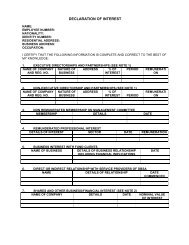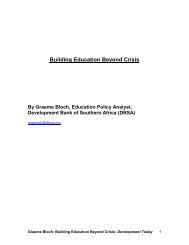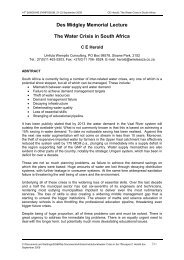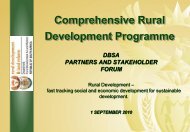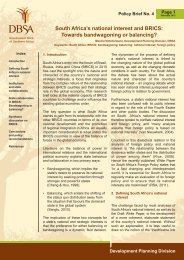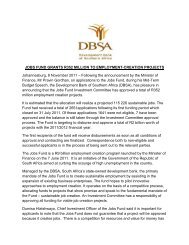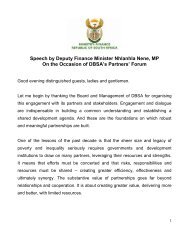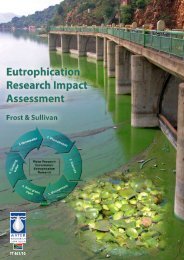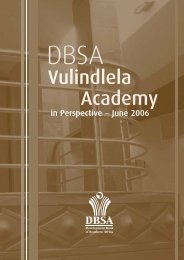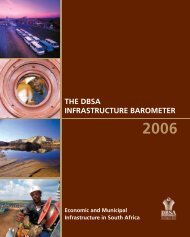A Knowledge Strategy
A Knowledge Strategy
A Knowledge Strategy
You also want an ePaper? Increase the reach of your titles
YUMPU automatically turns print PDFs into web optimized ePapers that Google loves.
Component<br />
sub-projects<br />
Deliverables/Outputs<br />
Accountability<br />
Input/Support/<br />
Collaboration<br />
Learning<br />
organisation<br />
• Learning organisation plan<br />
• Improve HRD & HR systems<br />
and processes<br />
• Accreditation<br />
Training Unit<br />
HR Unit<br />
KM culture<br />
• Culture change plan<br />
• KM training plan<br />
Office of CEO<br />
<strong>Knowledge</strong> focus<br />
area champions,<br />
Training Unit<br />
Improve<br />
information flows<br />
• Business process models<br />
• Implement process<br />
improvements<br />
• Update/integrate technology<br />
infrastructure & applications<br />
IT&S Unit<br />
Operations &<br />
Credit<br />
Administration<br />
unit<br />
<strong>Knowledge</strong><br />
accounting &<br />
reporting<br />
• Guidelines for quantifying<br />
DBSA knowledge assets &<br />
intellectual capital<br />
• Systems & capability for<br />
managing DBSA knowledge<br />
assets & intellectual capital<br />
• Guidelines for knowledge<br />
reporting<br />
DIBU & M&E<br />
<strong>Knowledge</strong> focus<br />
area champions,<br />
Financial<br />
Management<br />
Cluster, Office of<br />
the CEO<br />
2.8 Organisational fit<br />
The business plan of the Bank requires that its efforts be focused on building and<br />
strengthening its knowledge assets and capability, having the overall purpose of<br />
improving delivery of its strategic goals in achieving sustainable development.<br />
Accountability for identifying knowledge demands, applying knowledge tools and<br />
validating the quality and relevance of knowledge assets rests with the operational<br />
cluster in the Bank with others sharing in this responsibility. The role of the<br />
<strong>Knowledge</strong> Management Cluster is to provide infrastructure, support and expertise<br />
in knowledge management.<br />
A BSC model encapsulates the business case for knowledge management and<br />
illustrates the high-level view of how implementation directly serves the Bank’s<br />
organisational BSC. <strong>Knowledge</strong> management serves as an integrative layer providing<br />
a set of tools and events that merge operational demands for knowledge with expert<br />
input to produce relevant knowledge assets and capabilities of high quality.<br />
The ‘integration layer’ consists of the following tools, all of which require crossfunctional<br />
collaboration for effective implementation: a directory of expertise,<br />
communities of interest, information, shared learnings, peer assists, project<br />
retrospectives and communities of practice.<br />
2.9 Integrating and linking enterprise-wide initiatives<br />
<strong>Knowledge</strong> management in an organisation serves to integrate its diverse<br />
activities in providing knowledge content, decision support, knowledge processes and<br />
knowledge capacity. In this way, building knowledge assets and capabilities becomes<br />
a product of operational business processes. <strong>Knowledge</strong>, the common denominator,<br />
enhances the prospects of delivery of a number of processes and programmes.<br />
24 Development Bank of Southern Africa



